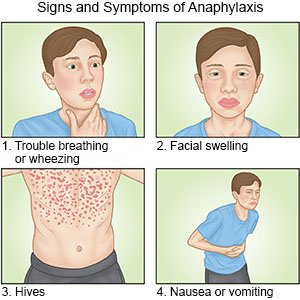Allergy Testing in Children
Medically reviewed by Drugs.com. Last updated on Aug 4, 2025.
Allergy testing is a way to find out if your child is allergic to something, called an allergen. Common allergens include pet dander, pollen, insect bites or stings, and certain foods, such as peanuts. Your child's healthcare provider will use an allergy test to check for a reaction to the allergen. During the test, your child's provider will watch for small skin reactions that show your child is probably allergic. The provider will also watch for a rare but serious reaction called anaphylaxis that needs immediate treatment.
DISCHARGE INSTRUCTIONS:
Call your local emergency number (911 in the US) if:
- Your child has any of the following signs or symptoms of anaphylaxis:

- Itching, a rash, hives that spread over his or her body
- Trouble breathing, swelling in his or her mouth or throat, or wheezing
- Feeling faint
Seek care immediately if:
- Your child has new or worsening rashes, hives, or itching.
Call your child's doctor if:
- Your child has an upset stomach or is vomiting.
- Your child has stomach cramps or diarrhea.
- You have questions or concerns about your child's condition or care.
Medicines:
- Antihistamines may be needed if your child has a reaction to the allergy test.
- Give your child's medicine as directed. Contact your child's healthcare provider if you think the medicine is not working as expected. Tell the provider if your child is allergic to any medicine. Keep a current list of the medicines, vitamins, and herbs your child takes. Include the amounts, and when, how, and why they are taken. Bring the list or the medicines in their containers to follow-up visits. Carry your child's medicine list with you in case of an emergency.
Follow up with your child's doctor as directed:
Your child may need more tests, or treatment for an allergy. Your child's doctor may also refer your child to a specialist. Write down your questions so you remember to ask them during your visits.
© Copyright Merative 2025 Information is for End User's use only and may not be sold, redistributed or otherwise used for commercial purposes.
The above information is an educational aid only. It is not intended as medical advice for individual conditions or treatments. Talk to your doctor, nurse or pharmacist before following any medical regimen to see if it is safe and effective for you.
Further information
Always consult your healthcare provider to ensure the information displayed on this page applies to your personal circumstances.
